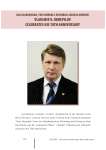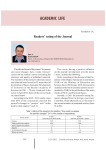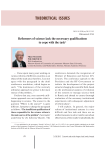Economic and Social Changes: Facts, Trends, Forecast @volnc-esc-en
Статьи журнала - Economic and Social Changes: Facts, Trends, Forecast
Все статьи: 1763
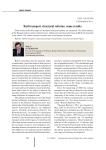
Rail transport structural reforms: some results
Статья научная
Some results of the third stage rail transport structural reforms are examined. The short analyses of the Russian railway system, infrastructure, rolling stock and main directions of R&D are presented in the article. The author touched economic and social impacts of reforms.
Бесплатно

Random and regular stock price change depending on a time span
Статья научная
The purpose for the research is to identify the correlation between random (accidental) stock price changes and its well-known tendency to grow depending on a time span. In contrast to the works of other scholars on the issue of the random nature of stock prices the presentation of the issue is new in the current research. The research method consisted of identifying the criterion stock price change separation into random and regular components and further comparing the proportions between random and regular stock price change on the example of 10 stocks of the largest world-known companies from representing different economic sectors traded on New York stock exchange for several time spans: one day, week, month, quarter, half-year and one year. The main research results suggest that with the increase in time span the share of the regular origin of the stock price increases, but only up to a certain significant limit. The increase in the time period of analyzing the stock price changes (fluctuations) does not prove that the random character of stock price change has an unlimited downward trend...
Бесплатно
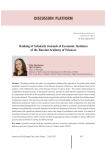
Ranking of scholarly journals of economic institutes of the Russian Academy of Sciences
Статья научная
The paper presents the results of comparative ranking of the journals in economics and related disciplines issued by economic institutes of the Russian Academy of Sciences. The ranking is based on the analysis of the bibliometric data of the Russian Science Citation Index. The author substantiated the composition of indicators that, in the author’s opinion, provide the most objective approach to evaluating the importance of the title in the scientific community, are the most transparent and make it easy to verify the results obtained. The ranking is based on an integral index calculated by the method of multidimensional comparative analysis. The index was calculated with the use of standardized coefficients, by normalizing the bibliometric indicators relative to the maximum values of the indicators under comparison. The data thus obtained helped distinguish the core consisting of ten leading journals in economics and related disciplines among those published by economic institutes of the Russian Academy of Sciences. These journals include publications with significant citation metrics and a wide range of contributors and readers. The degree of correlation between the final list and other rankings of economics journals proves that the composition of criteria proposed by the author and the method of aggregation makes it possible to obtain sufficiently accurate data suitable for ranking scientific journals.
Бесплатно
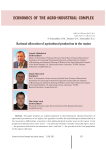
Rational allocation of agricultural production in the region
Статья научная
The paper proposes an original approach to determining the optimal allocation of agricultural production in the region; the approach includes the methodological substantiation of the necessity to differentiate consumers when addressing food security issues in the region. It was proposed to allocate three levels: level 1 - the provision of food to socially vulnerable layers, level 2 - the provision with food at the subsistence level, and level 3 - the provision of the total population of the region with food. A preliminary forecast was made for each municipality; it analyzed possible changes in the number of the socially vulnerable up to 2020; in accordance with medical standards and norms of the subsistence level the volumes of food were calculated, which in turn were compared with the actual production output. The difference between the actual volume and the volume of evidence- based requirements represented the very increase in the volume of production, the achievement of which requires certain investments on the basis of capital-output ratio...
Бесплатно
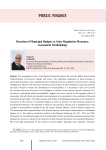
Reaction of municipal budgets to state regulation measures: assessment methodology
Статья научная
The geographical scale of the Russian Federation dictates the need for differentiated spatial implementation of economic strategy and tactics. The municipal component of these processes is particularly important, since a significant part of regional resources is formed at the local level, causing multiplicative effects in the structures operating in the territory. In the conditions of sanctions pressure and lack of funds to finance the development of municipalities, it is necessary to take into account the reaction and extent of activity of local budgets in relation to government incentive measures. It is necessary to understand which municipalities’ budgets react more actively to the managing effects of state policy; this will effectively stimulate the development of municipalities in the conditions of financial constraints of state bodies. The paper proposes and verifies a methodological approach to the comparative assessment of the activity of municipal budgets in terms of measures of state financial support for municipal development. The approach is based on the maximin criterion and is implemented on the example of municipalities included in the Far Eastern Federal District, which is Russia’s largest one. The information base comprises data of the Federal Treasury on the state of municipalities’ consolidated budgets for 11 Far Eastern constituent entities of the Russian Federation for 2011, 2015 and 2020. We analyze the consolidated budgets of all 164 municipal districts and 66 urban okrugs and estimate their comparative activity in relation to the measures of state financial stimulation of municipal development. We reveal high polarization of the activity of local budgets regarding state regulation measures. We show that the budgets of urban okrugs react more actively to government measures than the budgets of municipal districts. The budgets of urban districts formed a group of local budgets with the most active response to state regulation measures. Nevertheless, the transition of the Magadan and Sakhalin oblasts to single-level local government systems consisting only of urban okrugs by 2020 did not contribute to increasing the activity of the budgets of urban okrugs in these regions in relation to state regulation measures in comparison with other municipalities of the Far Eastern Federal District. The proposed mechanism makes it possible to provide territorial administration bodies with methodological tools for in-depth analysis and comparative assessment of the extent of activity of municipal budgets in relation to state regulation measures.
Бесплатно
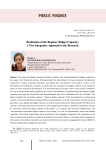
Realization of the regions’ budget capacity: a new integrative approach to the research
Статья научная
The paper investigates theoretical aspects related to the implementation of budget capacity at the stages of its formation and use. Having studied the determinants of socio-economic development contained in various economic doctrines, and taking into consideration the modern context of the functioning of the Russian economy, we show that the realization of budget capacity is an important factor in socio-economic development. The systematization of diverse views on the essence, definition of a set of controversial issues regarding the content and problems of implementing the regions’ budget capacity shows that the theoretical and methodological basis for its formation and use is limited. The paper considers the economic category “region’s budget capacity” from the perspective of integrating resource, fiscal and institutional characteristics, representing a set of not only created, but also attracted gratuitous / non-gratuitous budget resources, as web as reserves that can be realized under the influence of external / internal constraints and incentives. This interpretation makes it possible to specify the concept of “maximum achieved budget capacity of the region” as a capacity that has been implemented, and “the maximum achievable budget capacity of the region” as a set of implemented, reserve and hidden capacities. The article substantiates basic provisions of the integrative approach. The materials can be used in educational activities in studying disciplines in the field of finance, economics and management; they can also be useful to researchers as a basis for further research, and to management bodies of different levels to substantiate management decisions.
Бесплатно
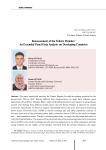
Reassessment of the Todaro paradox: an extended panel data analysis on developing countries
Статья научная
This paper empirically analyzes the Todaro Paradox for eight developing countries for the period from 1992 to 2019. Having different data characteristics, we apply three different panel approaches (Fixed Effect, Random Effect, and Full Modified Ordinary Least Square) by using distinct models. Our findings from different models depict that the Todaro Paradox is valid for the sample economies. Specifically, we observe a negative relationship between the price level ratio of purchasing power parity conversion factor (GDP) to market exchange rate and urban population contrary to the price level ratio of the purchasing power parity conversion factor (GDP) to the market exchange rate - rural population nexus. Thanks to obtaining these links, we apply the third empirical model to verify the Todaro Paradox. The analysis of the price level ratio of the purchasing power parity conversion factor (GDP) to the market exchange rate and total unemployment in the urban population provides strong evidence for the validity of this paradox. Deviated from the previous literature, this paper applies the price level ratio of the purchasing power parity conversion factor (GDP) to the market exchange rate since the higher the purchasing power parity of a country, the lower the rate of rural-urban migration is expected. By using one extra variable (unemployment), we test the Todaro Paradox. This combination of variables as well as different panel techniques (Fixed Effect, Random Effect, and Full Modified Ordinary Least Square) allow us to draw more robust conclusions. To address the challenges posed by rural-urban migration, policies should be designed to promote sustainable development in both urban and rural areas. This can include measures to create employment opportunities and improve the quality of life in both areas, as well as policies to regulate migration and manage the pressures caused by rapid urbanization.
Бесплатно
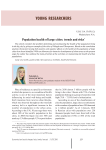
Recycling as the mechanism of ecological and economic equation of the regional development
Статья научная
In the article the role of recycling as the mechanism of the ecological and economic equation of the regional development is considered. The concept of recycling is proved; the problems, conditions and factors of its development are explored. The measures of recycling waste products from production and consumption are analyzed; recommendations on the recycling development in the region (including the organizational economic mechanism) are given.
Бесплатно

Recycling in modern Russia: need, challenges, and prospects
Статья научная
At present, in connection with the global financial and economic crisis of 2008-2009, the scientific community is discussing issues related to significant changes in the model of economic growth, its sources and factors, taking into account the so-called concept of “denouement” and its “reconciliation” with the geosphere restrictions on economic activity. Against this background, a neo-industrial paradigm of modern development proposed by the Russian economic school in the 2000s and focused on the resource aspect of the economy is gaining professional and public recognition. In this regard, the goals of our study are as follows: to develop the scientific idea of creating a new resource base for social reproduction on the basis of unused production and consumption waste, to identify barriers to establishing a recycling economy in Russia, and to work out proposals for effective development of recycling in the domestic economy. The study is based on an interdisciplinary (integrative) approach, which goes in line with the principles of sustainable economic and environmental growth, humanistic and inclusive development, and public-private partnership; thus, it is of fundamental importance for the analysis of the transformation of the model of economic growth in the process of changing the economic paradigm...
Бесплатно
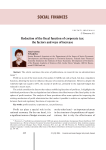
Reduction of the fiscal function of corporate tax: the factors and ways of increase
Статья научная
The article continues the series of publications on research into tax administration issues. Profit tax is one of the main tools of tax policy. It fulfills not only a fiscal, but also a regulatory function, allowing the state to influence the pace of economic development. However, despite the relatively high rate equal to 20%, the receipt of profit tax, primarily in the regional budgets has reduced in recent years. The article considers the factors that reduce mobilizing functions of profit tax. It highlights the individual provisions of the tax legislation that influence the effectiveness of the fiscal policy in the sphere of profit taxation. The analysis of these provisions offers some options for improving the existing mechanism of profit administration that makes it possible to achieve an optimal balance between fiscal and regulatory functions of corporate tax.
Бесплатно
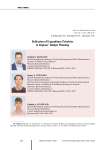
Reflection of expenditure priorities in regions’ budget planning
Статья научная
The paper investigates the extent to which the strategic and budgetary documents of constituent entities of the Russian Federation reflect a multi-scenario approach to forecasting budget parameters and identify spending priorities. The analysis is based on the example of the regions included in the Northwestern Federal District. The relevance of the study is due to the fact that budget policy as a whole has a multi-scenario nature. Therefore, in order to increase the effectiveness of public administration on the part of the authorities, it is important to assess the risks of budget execution and develop a response plan to minimize their negative consequences, which requires, among other things, prioritization of expenditures. The paper uses methods of structural and substantive analysis of regulatory and program documents of strategic and budgetary planning at the level of constituent entities of the Russian Federation, the method of rating regional budget planning documents according to the authors’ criteria and the method of grouping budget expenditures within regional projects, which are a decomposition of federal projects. The scientific significance of the study lies in formulating the problem of using a multi-scenario approach in the development of budget planning documents and reflecting spending priorities in them, assessing the severity of this problem at the regional level and common ways to address it. The novelty of the work lies in the fact that for the first time all the main documents of budget forecasting and planning in the regions of the Northwestern Federal District have been studied. It has been established that the vast majority of budget forecasts and the main directions of budget policy are presented only in the basic version. Strategic and budget planning documents virtually do not offer a multivariate forecast of regional budget revenue and expenditure items. Consequently, spending priorities are not set properly. It is shown that a significant proportion of actual regional expenditures coincide with federal priorities and they reflect the list of expenditure obligations stipulated in federal legislation. The theoretical significance of the study lies in substantiating the need to apply a multi-scenario approach to the disclosure of budget policy priorities at the regional level, the practical significance consists in updating the details of documents for medium- and long-term strategic and budgetary planning – in preparing a separate section with disclosure of information on a multi-scenario approach to forecasting and on priority areas of spending
Бесплатно
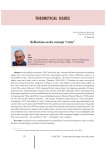
Reflections on the concept “crisis”
Статья научная
In the preface to the book “The Crisis of Our Age” its author Pitirim Aleksandrovich Sorokin argues that “every important aspect of the life, organization and the culture of Western society is in extraordinary crisis”. And he continues his words of prophecy: “Its body and mind are sick and there is hardly a spot on its body which is not sore” [Sorokin, 1948 (1942): 7]. Sorokin, of course, was not the only one who perceived their modernity as being in a crisis. T.G. Masaryk wrote about many aspects of the “crisis” of his time in the late 19th century. Georg Simmel studied the crisis of culture in the beginning of the 20th century [Simmel, 1983]; Sigmund Freud warned about the dangerous potential of human destructiveness, Oswald Spengler announced the “decline of the West” [Spengler, 2011], and Joseph Alois Schumpeter argued that cyclical manifestations of economic crises1 relate to the economy like heartbeat to a living organism. While Adolf Hitler was consolidating his power, Edmund Husserl [Husserl, 1972] lectured on “the crisis of the European Sciences”, and Georges Friedmann spoke about the “crisis of progress” [Friedmann, 1937]...
Бесплатно
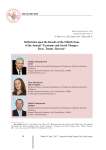
Статья научная
Dear reader!You are looking at the 50th issue of the journal “Economic and Social Changes: Facts, Trends, Forecast”, the leading periodical of RAS Institute of Socio-Economic Development of Territories.In cooperation with the Department of Social Sciences of the Russian Academy of Sciences, regional government and Vologda City Administration, ISEDT RAS promotes academic scientific knowledge in the Vologda Oblast for over 25 years. Throughout its development the Institute has always focused on deep historical traditions of domestic and world science and, simultaneously, on innovation trends emerging in accordance with the needs of socio-economic and socio-political life. The system built in a quarter of a century was formed exclusively for one purpose - to create a cell of self-developing fundamental scientific knowledge in the Vologda Oblast.The history of the journal “Economic and Social Changes: Facts, Trends, Forecast” largely reflects the development of ISEDT RAS itself and the Department of Social Sciences...
Бесплатно
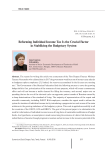
Reforming individual income tax is the crucial factor in stabilizing the budgetary system
Статья научная
The reason for writing this article was a statement of the First Deputy Finance Minister Tatyana Nesterenko who claimed that in 2017 the government would run out of money to pay salaries to budgetary sphere employees [3]. Indeed, the reserves accumulated in the fat years are running out1. The Government of the Russian Federation finds the following sources to cover the growing budget deficit: first, privatization of the remnants of state property, which will create a momentary effect and will not become a stable channel for filling the treasury; and second, major cuts on spending that on the eve of the electoral cycle can aggravate protest moods of Russians caused by a sharp deterioration of the standard of living. The majority of representatives of the expert and scientific community, including ISEDT RAS employees, consider the urgent need to reform the system for taxation of individual income tax by introducing a progressive tax scale as one of the main solutions to the growing imbalance of the budgetary system...
Бесплатно
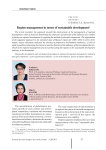
Region management in terms of sustainable development
Статья научная
The article considers the approach towards the improvement of the management of regional development, which is based on determining the character and direction of the influence of a number of factors on regional development by applying the method of principal components. The approbation of the suggested approach to the statistical data of Russian regions for 2000-2010 in terms of the region's major subsystems indicated the absence of progressive development tendencies, as well as made it possible to determine the character and the direction of the influence of the investigated factors, which in the regional management practice permit taking the regions to the sustainable development pathway, to be determined.
Бесплатно
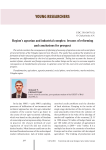
Region's agrarian and industrial complex: lessons of reforming and conclusions for prospect
Статья научная
The article considers the consequences of reforming of economy of agrarian sector and social sphere of rural territories of the Vologda region for last 20 years. The author has analyzed the tendencies of formation of multi-structural agriculture in region. On the basis of integrated index the region’s municipal formations are differentiated by the level of agrarian potential. Taking into account the lessons of market reforms, domestic and foreign experience the author brings out the ways to overcome negative consequences of transformation processes in agrarian sector for the near-term and medium-term prospect.
Бесплатно
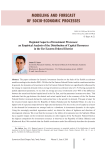
Статья научная
The paper estimates the dynamic investment function on the basis of the flexible accelerator model according to the data for 2000-2016 for the Far Eastern Federal District and its constituent entities. In general, the dynamics of investment in the Far Eastern Federal District are significantly influenced by the change in expected demand with an average investment accelerator value of 1.78. Having assessed the partial adjustment parameter, we see that on average per year, investments cover 40% of the difference between the actual and desired capital stock in the Far East, and the parameter increases over time. This indicates that the gap between the desired and actual capital stock in the economy of the Far Eastern Federal District increased during the study period due to the growth in demand. This gap is larger for the resource-based regions like the Republic of Sakha (Yakutia) and the Sakhalin Oblast; it is due to a higher level of expected output driven by high external demand...
Бесплатно

